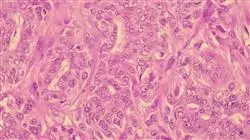University certificate
The world's largest faculty of medicine”
Introduction to the Program
This training will generate a sense of security in the performance of medical practice, which will help you grow personally and professionally”

Currently, there has been much research into cutting-edge treatments and advances to increase the ability to eliminate emerging malignancies, such as anti-PD1 and anti-PDL1 antibodies, which are increasingly demonstrating efficacy in patient outcomes.
Professionals in the oncology field need to constantly update their knowledge related to cancer treatments in order to be able to offer patients the most suitable treatment based on their real needs.
This Postgraduate diploma in Female Pathology Anatomy offers the possibility to specialize in the treatment of cancer in women, in order to become an excellent professional in the treatment of diseases specific to the female gender.
The training will allow you to develop the competencies, skills and abilities that are conducive to the performance of the profession, generating greater added value to your professional performance.
This program is developed by a range of professionals of the highest prestige in the oncology field, who provide each module with their own professional experiences, the most outstanding advances and the most effective treatments in each of the cancer specialties offered by this training. A great opportunity to specialize in Female Pathological Anatomy from the hands of those who know the most about this subject.
Update your knowledge with this Postgraduate diploma in Female Pathology Anatomy"
This Postgraduate diploma in Female Anatomy and Pathology contains the most complete and up-to-date scientific program on the market. The most important features of the program include:
- Development of more than 75 case studies presented by experts in Female Pathological Anatomy
- The graphic, schematic, and eminently practical contents with which they are created provide scientific and practical information on the disciplines that are essential for professional practice
- News on Female Pathological Anatomy
- It contains practical exercises where the self-evaluation process can be carried out to improve learning
- Special emphasis on innovative methodologies in Female Pathology Anatomy
- All of this will be complemented by theoretical lessons, questions to the expert, debate forums on controversial topics, and individual reflection assignments
- Content that is accessible from any fixed or portable device with an Internet connection
This Postgraduate diploma may be the best investment you can make in the selection of a refresher program for two reasons: in addition to updating your knowledge in Female Anatomy and Pathology, you will obtain an expert Postgraduate diploma from TECH Global University"
Its teaching staff includes professionals from the field of Female Anatomy and Pathology, who bring their work experience to this training, as well as recognized specialists belonging to renowned societies and prestigious universities.
The multimedia content developed with the latest educational technology will provide the professional with situated and contextual learning, i.e., a simulated environment that will provide immersive training program to train in real situations.
This program is designed around Problem Based Learning, whereby the professional must try to solve the different professional practice situations that arise during the course. For this purpose, the professional will be assisted by an innovative interactive video system created by renowned and Pathology and experienced experts in the field of anatomical pathology with extensive medical experience.
Its teaching staff includes renowned specialists from prestigious universities"

Take the opportunity to learn about the latest advances in Female Anatomy and Pathology and improve your patient care"
Why study at TECH?
TECH is the world’s largest online university. With an impressive catalog of more than 14,000 university programs available in 11 languages, it is positioned as a leader in employability, with a 99% job placement rate. In addition, it relies on an enormous faculty of more than 6,000 professors of the highest international renown.

Study at the world's largest online university and guarantee your professional success. The future starts at TECH”
The world’s best online university according to FORBES
The prestigious Forbes magazine, specialized in business and finance, has highlighted TECH as “the world's best online university” This is what they have recently stated in an article in their digital edition in which they echo the success story of this institution, “thanks to the academic offer it provides, the selection of its teaching staff, and an innovative learning method aimed at educating the professionals of the future”
A revolutionary study method, a cutting-edge faculty and a practical focus: the key to TECH's success.
The most complete study plans on the university scene
TECH offers the most complete study plans on the university scene, with syllabuses that cover fundamental concepts and, at the same time, the main scientific advances in their specific scientific areas. In addition, these programs are continuously being updated to guarantee students the academic vanguard and the most in-demand professional skills. In this way, the university's qualifications provide its graduates with a significant advantage to propel their careers to success.
TECH offers the most comprehensive and intensive study plans on the current university scene.
A world-class teaching staff
TECH's teaching staff is made up of more than 6,000 professors with the highest international recognition. Professors, researchers and top executives of multinational companies, including Isaiah Covington, performance coach of the Boston Celtics; Magda Romanska, principal investigator at Harvard MetaLAB; Ignacio Wistumba, chairman of the department of translational molecular pathology at MD Anderson Cancer Center; and D.W. Pine, creative director of TIME magazine, among others.
Internationally renowned experts, specialized in different branches of Health, Technology, Communication and Business, form part of the TECH faculty.
A unique learning method
TECH is the first university to use Relearning in all its programs. It is the best online learning methodology, accredited with international teaching quality certifications, provided by prestigious educational agencies. In addition, this disruptive educational model is complemented with the “Case Method”, thereby setting up a unique online teaching strategy. Innovative teaching resources are also implemented, including detailed videos, infographics and interactive summaries.
TECH combines Relearning and the Case Method in all its university programs to guarantee excellent theoretical and practical learning, studying whenever and wherever you want.
The world's largest online university
TECH is the world’s largest online university. We are the largest educational institution, with the best and widest online educational catalog, one hundred percent online and covering the vast majority of areas of knowledge. We offer a large selection of our own degrees and accredited online undergraduate and postgraduate degrees. In total, more than 14,000 university degrees, in eleven different languages, make us the largest educational largest in the world.
TECH has the world's most extensive catalog of academic and official programs, available in more than 11 languages.
Google Premier Partner
The American technology giant has awarded TECH the Google Google Premier Partner badge. This award, which is only available to 3% of the world's companies, highlights the efficient, flexible and tailored experience that this university provides to students. The recognition as a Google Premier Partner not only accredits the maximum rigor, performance and investment in TECH's digital infrastructures, but also places this university as one of the world's leading technology companies.
Google has positioned TECH in the top 3% of the world's most important technology companies by awarding it its Google Premier Partner badge.
The official online university of the NBA
TECH is the official online university of the NBA. Thanks to our agreement with the biggest league in basketball, we offer our students exclusive university programs, as well as a wide variety of educational resources focused on the business of the league and other areas of the sports industry. Each program is made up of a uniquely designed syllabus and features exceptional guest hosts: professionals with a distinguished sports background who will offer their expertise on the most relevant topics.
TECH has been selected by the NBA, the world's top basketball league, as its official online university.
The top-rated university by its students
Students have positioned TECH as the world's top-rated university on the main review websites, with a highest rating of 4.9 out of 5, obtained from more than 1,000 reviews. These results consolidate TECH as the benchmark university institution at an international level, reflecting the excellence and positive impact of its educational model.” reflecting the excellence and positive impact of its educational model.”
TECH is the world’s top-rated university by its students.
Leaders in employability
TECH has managed to become the leading university in employability. 99% of its students obtain jobs in the academic field they have studied, within one year of completing any of the university's programs. A similar number achieve immediate career enhancement. All this thanks to a study methodology that bases its effectiveness on the acquisition of practical skills, which are absolutely necessary for professional development.
99% of TECH graduates find a job within a year of completing their studies.
Postgraduate Diploma in Female Anatomy and Pathology
Explore Female Pathological Anatomy with University Experts at TECH Global University! Are you passionate about the thorough and precise study of the human body? Do you wish to delve into the fascinating world of female pathological anatomy? Then this virtual program is for you! At TECH Global University, we offer you the unique opportunity to immerse yourself in a Postgraduate Diploma in Female Anatomy and Pathology, designed so that you can develop solid skills and specialized knowledge from the comfort of your home. During the program, you'll explore in depth the specific diseases and disorders that affect the female reproductive system, from diagnosis to treatment. You'll immerse yourself in the anatomy and physiology of the female organs, as well as methods of evaluation and analysis of pathological specimens. In addition, you will acquire hands-on skills in the operation of state-of-the-art equipment and technologies used in the field.
The future awaits you and at TECH we are here to help you achieve it
Our team of highly qualified faculty will accompany you throughout the program, providing you with quality specialization and real-world experience in the field of female pathological anatomy. They will guide you through the fundamental concepts, the most advanced techniques and the latest research in the field - you will learn from the best to become an expert yourself! Upon completion of the program, you will receive an internationally recognized certificate, endorsed by the Faculty of Medicine at TECH Global University. This certificate will be a solid proof of your experience and competence in female anatomic pathology, opening doors to various career opportunities. You will be able to work in hospitals, clinics, research laboratories and collaborate with multidisciplinary medical teams, contributing to the health and well-being of women worldwide. Don't miss the opportunity to study at TECH and become an expert in Female Anatomic Pathology! Step into a fascinating world, develop specialized skills and discover a constantly growing field - enroll today and prepare yourself for a promising professional future!







